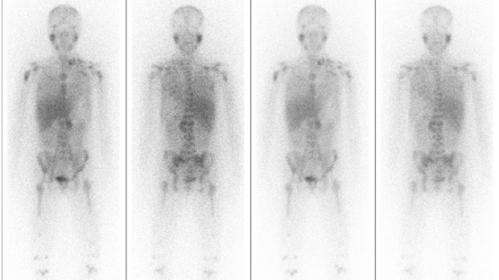New imaging technique provides hope for deadly childhood cancer

Cancer Research UK's Centre for Drug Development (CDD), in collaboration with the Rising Tide Foundation (link is external), a Swiss-based non-profit organisation which funds innovative cancer trials, today (TUESDAY) announce a new trial at The Royal Marsden (link is external)and University College London (link is external)that could revolutionise how children with one of the deadliest forms of cancer are diagnosed. The news falls in Children's Cancer Awareness Month, which runs throughout September.
Neuroblastoma affects around 100 children in the UK each year, mostly aged five or under.
Despite five year survival rates from neuroblastoma rising from around 17 per cent in the early 1970s to 64 per cent today, the most aggressive form of the disease remains very difficult to treat.
To determine how aggressive the tumour is and find the best possible treatment, doctors carry out multiple scans employing a variety of techniques. These can be distressing for very young children, particularly as it is often necessary to carry them out under a general anaesthetic. Better scans are urgently needed to diagnose and treat patients with neuroblastoma.
One of the scans - called a planar scintigraphy scan - involves children being injected with a small amount of a radioactive iodine tracer, called [123I]mIBG, which is absorbed by the neuroblastoma cells to make them visible on the scan.
In this trial, children will instead be given a different radioactive iodine tracer called [124I]mIBG which is chemically identical to [123I]mIBG but emits a different type of radiation that can be picked up on a PET/CT scan. This new type of PET/CT scan will give a more accurate three dimensional picture to pinpoint where the neuroblastoma has grown or spread.
Doctors can use this information to offer the best treatment options for each patient depending upon how well their cancer has responded to treatment and the risk of it returning.
The new [124I]mIBG PET/CT scan will help doctors to measure how well new treatments being tested in clinical trials are working and to choose which patients would most benefit from taking part in these trials. This scan may also remove the need for multiple scans for patients in the future.
Around 25 children will take part in the trial at The Royal Marsden NHS Foundation Trust, and University College London Hospital, with radiotracer manufacture being carried out by the Wolfson Molecular Imaging Centre, Manchester. If successful the new technique could be offered to children with neuroblastoma across the UK and abroad.
Amy, whose daughter Poppy was diagnosed with neuroblastoma in 2009, said: "Having been through cancer treatment with our daughter, it's great to hear that research is continuing to look at ways to improve the way children are treated. Poppy was only three when she was diagnosed and her treatment was part of a trial.
"Children can get scared easily and, with Poppy being so young, it was hard to watch her go through all the tests even though we knew they were necessary to save her life. But thankfully we've come out the other side of that period of our lives and she is now doing well. Anything that can make hospital visits less traumatic, and that improves the accuracy of diagnoses and treatments is worth pursuing and could make a real difference to children with cancer."
Study leader Dr Sue Chua, consultant radiologist and nuclear medicine physician at The Royal Marsden, said: "Offering children a single PET scan instead of multiple scans would take a lot of the stress out of getting neuroblastoma diagnosed, while still providing doctors with the information they need to decide on the best course of treatment. Often the more aggressive form of the disease isn't picked up until conventional treatments fail, so we also hope this trial will help diagnose the disease earlier so treatment can be adapted accordingly."
Dr Nigel Blackburn, director of Cancer Research UK's centre for drug development, said: "Having to perform multiple scans on young children to diagnose their cancer can be distressing for the whole family, so we're delighted to be funding and managing this trial.

















